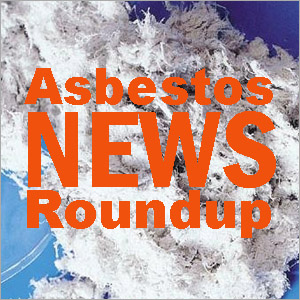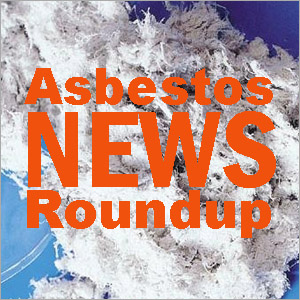Asbestos Mesothelioma Archive
Asbestos News Roundup: 5.13.10
May 13th, 2010. By LucyC
A roundup of recent asbestos-related news and information that you should be aware of.
Asbestos Lawsuits 
Charleston WV: Forty companies have been named as defendants in an asbestos lawsuit filed by Pamela S. Massie and William D. Kautz. The couple allege that the defendants were responsible for Dale M. Kautz’s asbestos mesothelioma and resulting death: he was diagnosed with mesothelioma on May 1, 2008, and died on June 24, 2008.
Dale Kautz was non-smoker. He worked as a farmer, laborer and mechanic, and also worked on construction and maintenance on family farm from 1956 through to 2006. Among the numerous allegations, the suit claims that the defendant companies were negligent and provided contaminated buildings.
The 40 companies named as defendants in the suit are: A.O. Smith Corporation; A.W. Chesterton; Baldor Electric Company; Black & Decker (U.S.), Inc.; Borg-Warner Automotive, Inc.; Case IH Agricultural Equipment, Inc.; Caterpillar, Inc.; Clark Material Handling Company; Cleaver-Brooks Company, Inc.; Cooper Industries, LLC; Crane Co.; Eaton Electrical, Inc.; Farm Fans, Inc.; Flowserve US, Inc.; Ford Motor Company; Garlock, Inc.; General Electric Company; the Gorman-Rupp Company; Honeywell International, Inc.; Industrial Holdings Corporation; Ingersoll-Rand Company; John Deere Company; Kalsey-Hayes Company; Lennox Industries, Inc.; Mat Holdings, Inc.; Metropolitan Life Insurance Company; Navistar, Inc.; New Holland, Inc.; Rockwell Automation, Inc.; Schneider Electric USA, Inc.; State Electric Supply Company; the Goodyear Tire & Rubber Company; the Cincinnati Gasket, Packing & Manufacturing, Inc.; Uniroyal, Inc.; Valley Brook Concrete & Supply, Inc.; Viacom, Inc.; Westinghouse Electric Corporation; Vimasco Corporation; West Virginia Electric Supply Company; and Wheel Horse Products, Inc. (WV Record.com)
Madison County, IL: A couple who filed an asbestos lawsuit in Madison County on May 3, have also filed an asbestos complaint six days earlier, on April 27th, in St. Clair County. In the suit filed Read the rest of this entry »
Rough Sailing for Asbestos–Exposed Workers and even Residents at Portland Shipyard
May 12th, 2010. By janem
 If you ever worked at the Portland Shipyard in Oregon or even lived closeby, you-and potentially family members– may have been exposed to high levels of asbestos and could be at risk for asbestos disease, including asbestosis and mesothelioma.
If you ever worked at the Portland Shipyard in Oregon or even lived closeby, you-and potentially family members– may have been exposed to high levels of asbestos and could be at risk for asbestos disease, including asbestosis and mesothelioma.
Close to 200 US shipyards are known for asbestos exposure, including Portland Shipyard, which was originally created in 1903 and known as the largest commercial and publicly run shipyard within the US.
Those who worked at the shipyards and face the greatest risk of asbestos exposure include plumbers and insulators who worked with boilers, steam pipes, hot water pipes, and incinerators; longshoremen and military personnel. And even residents near Portland Ship Repair, which is owned and operated by Cascade General.
Portland Harbor is designated a ‘Superfund’ site because the surrounding environment contains high levels of dangerous contaminants, mainly due to the Portland Shipyard Repair. A Superfund Site puts area residents at risk for disease and the loss of property value due to environmental damage. The harbor is also designated for significant cleanup and to offer protection to those individuals that may suffer from related disease such as asbestosis, and/or a large loss of value in their homes. Asbestos was found at significant levels in the area.
Although Cascade has taken steps to clean up its act and make sure no further pollution and hazardous materials are released into the area’s environment, they can’t repair the damage caused since the 1940s or even earlier. Shipyard workers before 1980 were heavily exposed to asbestos, particularly during World War II when thousands of ships were being built at lightening speed to support the war effort. Portland Shipyard opened in 1942, when they began to build Liberty ships. Portland ran its own facility until 1995, when Cascade General took it over.
According to a recent study by the Mt. Sinai School of Medicine, 86 percent of the shipyard workers tested with 20+ years of work experience had developed some kind of asbestos-related lung cancer or disease. Before the 1980s, workers rarely used protective gear and clothing when surrounded by asbestos and other dangerous toxins. Most people were unaware that asbestos was harmful because it was kept on the QT by manufacturers, corporations and insurance companies until the late 1970s.
If the war didn’t kill them, asbestos might.
Asbestos News Roundup: 5.7.10
May 7th, 2010. By LucyC
A roundup of recent asbestos-related news and information that you should be aware of.
Asbestos Lawsuits
South East Texas: The children of a recently deceased man have filed an asbestos lawsuit against the petroleum giant Chevron, alleging their father was lethally exposed to asbestos during his career with company as a helper electrician and operator.
According to the lawsuit, Cyrus Kugler developed asbestos-related lung cancer from which he died on July 15, 2008. His children cite Chevron for a number of negligent acts, including allowing their father to work around the substance when Chevron knew of its hazards, exposing him to asbestos, failing to timely and adequately warn him of the dangers of asbestos exposure and failing to take proper precautions to ensure that he was not exposed to asbestos. (setexasrecord.com)
Charleston, WV: The widow of James A. Boggs has filed an asbestos-related lawsuit over her late husband’s cause of death which names 85 companies as defendants.
Deborah E. Boggs’ late husband was a production foreman and plant operator at Conoco Venco in Moundsville. He was diagnosed with asbestosis and lung cancer, according to a complaint filed April 12 in Kanawha Circuit Court.
Mrs. Boggs alleges that her husband was exposed to asbestos products during the years he worked for the defendants and that they failed to warn him of the dangers of the products to which he was exposed. Mrs. Boggs further claims that the defendants knew or should have known that exposure to the asbestos-containing products would cause disease and injury. Mr. Boggs was diagnosed with asbestosis and lung cancer.
The 85 defendant companies are: 20th Century Glove Corporation; Allied Glove Corporation; Anchor Packing Company; Armstrong International, Inc.; Aurora Pump Company; A.W. Chesterton Read the rest of this entry »
Asbestos News Roundup: 4.29.10
April 29th, 2010. By LucyC
A roundup of recent asbestos-related news and information that you should be aware of.
Asbestos Lawsuits
Charleston, WV: The widow of William D. Thompson is suing her late husband’s employer, CSX Transportation, Inc, alleging wrongful death in an asbestos-related suit.
Mary Thompson’s husband worked for CSX from 1971 until 1988 and during that time, she alleges he was exposed to toxic substances, including asbestos, chemicals and diesel exhaust, which in whole or in part, caused him to develop lung cancer, which he was diagnosed with in July 2008.
The complaint alleges that CSX did not provide a reasonably safe work environment; furnish Mr. Thompson with safe and suitable tools and equipment; warn Mr. Thompson of the true nature and hazardous effects of the asbestos, chemicals and diesel fumes; test asbestos-containing products prior to requiring employees to work with them; and formulate and implement a safe method for handling asbestos, chemicals and diesel fumes. (WVRecord.com)
Madison County, IL: Seventeen new asbestos lawsuits have been filed in recent weeks in Madison County, among them, a suit brought by Orlene Dicks of Florida who claims her late husband, Emory Lee Dicks, developed mesothelioma after his work as a boatswains mate and truck driver at various locations from 1942 until 1964 and from 1966 until 1978.
And Teresa Montesano of California, also recently widowed, claims her husband, Ronney Montesano, who developed mesothelioma and subsequently died, was exposed to the lethal substance during his work in a variety of environments which would all have used asbestos. He worked as a member of the U.S. Navy; as a mill work performer and as a worker at Gray’s Harbor for 10 years, as an insulator, as a home remodeler in the 1960s and as an automotive repair worker in the 1960s and the 1970s. (MadisonRecord.com)
Asbestos Settlements
Mercerville, NJ: New Jersey based Congoleum Corp, a manufacturer of commercial and residential Read the rest of this entry »
Asbestos Corporate Bankruptcies: Don’t Shed A Tear
April 29th, 2010. By admin
 Guest blogger, RJ Abernathy, is an Asbestos attorney with Goldenberg Heller Antognoli and Rowland. He has a unique perspective as an asbestos lawyer, having been a Laborer with Local 100 in East St. Louis, Illinois for over 20 years prior to becoming an attorney. As a Laborer, he worked in many of the same conditions as those in which his clients have worked. Abernathy also lost his own father to asbestos-related cancer in 1999.
Guest blogger, RJ Abernathy, is an Asbestos attorney with Goldenberg Heller Antognoli and Rowland. He has a unique perspective as an asbestos lawyer, having been a Laborer with Local 100 in East St. Louis, Illinois for over 20 years prior to becoming an attorney. As a Laborer, he worked in many of the same conditions as those in which his clients have worked. Abernathy also lost his own father to asbestos-related cancer in 1999.
A recent article published by an arm of the US Chamber of Commerce noted that another company “collapsed” under the weight of asbestos claims. According to this article, 89 such companies have “collapsed” since 1982. In the latest case, Durabla Manufacturing sold asbestos containing products well into the 1980’s, long after asbestos was recognized as a dangerous and deadly material. 
A closer look at the other 88 “collapsed” companies reveals that not only have many of these companies remained in business, but many of them thrived after ‘going bankrupt.’ Walk into any Home Depot or Lowe’s home improvement stores and you will find a large percentage of these “collapsed” companies’ products on the shelves. For example, the Pink Panther didn’t lose his job when Owens Corning went bankrupt. Dick Cheney’s former employer, Halliburton, never missed a beat over the past seven years during the Iraq war since filing for bankruptcy protection due to its subsidiaries asbestos liabilities.
In another case, W.R. Grace filed for bankruptcy protection in 2001, even though it has annual sales of nearly 3 billion dollars. In 2005, the United States Department of Justice filed criminal charges against Grace, including counts for fraudulent transfers of nearly 5 billion dollars just prior to the bankruptcy filing.
In other cases, I think it is hard to argue that these companies should not have “collapsed.” The miners, manufacturers and purveyors of raw asbestos fibers should have been out of business Read the rest of this entry »
Archive by Category
- Accidents (24)
- Airlines (9)
- Asbestos Mesothelioma (262)
- Automotive (25)
- Celebrity (14)
- Class Action (84)
- Complaints/Comments (15)
- Consumer Fraud (84)
- Contest (2)
- Court of Public Opinion (5)
- Crazy Sh*t Lawyers See (61)
- Criminal Law (4)
- Defective Products (111)
- DePuy ASR Hip Recall (2)
- Discrimination (22)
- Drugs/Medical (248)
- Elder Care Abuse (4)
- Emerging Issues (462)
- Employment (54)
- Environment (52)
- Financial (28)
- Food Illness (15)
- Human/Civil Rights (4)
- Insecurities (5)
- Insurance (16)
- Intellectual Property (16)
- Internet/E-commerce (19)
- lawsuits (161)
- Lawyers (20)
- Lawyers Giving Back (43)
- Lex Levity (10)
- Personal Injury (106)
- Pleading Ignorance (53)
- Real Estate (2)
- Recall (6)
- Scam (3)
- Securities (13)
- Settlement (81)
- Tort Reform (2)
- Totally Tortelicious (81)
- Veterans (11)
- Whistleblower (9)